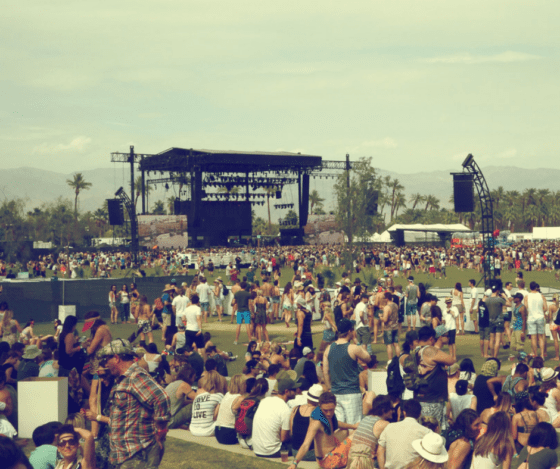Guide
The History Of Coachella Festival
The Coachella Valley Music and Arts Festival, commonly known as Coachella, has evolved from a daring desert experiment into one of the most iconic and influential music festivals in the world. Held annually in Indio, California, Coachella is not just a music event—it’s a cultural movement, fashion runway, art exhibition, and generational pilgrimage. In this feature, we explore the complete history of Coachella, tracing its roots, evolution, controversies, and lasting legacy.
Origins: A Festival Born from Rebellion (The History Of Coachella Festival)
Coachella started in 1993 when Pearl Jam organised a boycott against Ticketmaster and gave a performance at the Empire Polo Club in Indio. This defiant concert demonstrated that big events outside of conventional corporate supervision might take place at the desert site. Inspired by this possibility, Goldenvoice co-founders Paul Tollett and Rick Van Santen started developing a vision fit for Coachella.
By October 1999, that vision materialized. The inaugural Coachella Festival featured alternative titans like Beck, Tool, and Rage Against the Machine, drawing around 25,000 attendees. Despite critical acclaim, the event lost nearly $1 million—putting its future in jeopardy.
Why Is It Called Coachella? (The History Of Coachella Festival)
The Coachella Valley, Southern California’s area which hosts the festival, is where the name Coachella comes from. Fascinatingly, the name itself is said to be a misreading of “Conchilla,” a Spanish word meaning “little shell,” referring the fossilised sea shells unearthed in the desert from when the region was underwater millions of years ago. The valley adopted the name formally and the spelling changed over time to become “Coachella.” When Goldenvoice started the music festival in 1999, they chose “Coachella” not simply to reflect its geographical location but also to conjure a sense of mystique and uniqueness—something that fit very well with the festival’s diverse and artistic energy.
The Early 2000s: Finding Footing (The History Of Coachella Festival)
Coachella had a one-year break in 2000 then came back in 2001 as a single-day festival. Headliners like Jane’s Addiction helped the festival start to carve out a niche as a refuge for indie, electronic, and alternative music. Every year brought more acceptance.
2003 saw The White Stripes, The Beastie Boys, and Red Hot Chili Peppers, marking Coachella’s shift into a mainstream consciousness.
With Radiohead and The Cure fronting, Coachella sold out for the first time in 2004, therefore confirming its reputation for selecting both iconic and up-to-date performers.
Mid-2000s: Expansion and Breakthroughs (The History Of Coachella Festival)
The mid-2000s witnessed Coachella’s metamorphosis into a global powerhouse. Notable milestones include:
2006: The reunion of Daft Punk became one of the most iconic live performances in festival history, largely credited with inspiring a new generation of electronic music fans and artists.
2007: The highly anticipated return of Rage Against the Machine and a surprise performance from Prince elevated Coachella’s prestige.
The festival expanded to two days, then three by 2007, and began attracting international attention for its eclectic lineups, art installations, and celebrity attendees.
2010s: Global Recognition and Cultural Influence (The History Of Coachella Festival)
The 2010s heralded Coachella’s reign as the most buzzworthy music event on the planet.
2011: Kanye West’s groundbreaking set redefined live hip-hop performances, further blending high art and music.
2012: The introduction of two consecutive weekends—featuring identical lineups—marked a turning point. Tickets sold out in hours, and the festival grossed over $47 million.
2018: Beyoncé’s headline performance, dubbed “Beychella,” broke boundaries in representation, artistry, and production. It was the first time a Black woman headlined the festival.
Coachella had become more than a music event—it was a cultural phenomenon. Instagram aesthetics, fashion trends, influencer culture, and even politics found a stage in the Indio desert.
The Role of Art and Sustainability (The History Of Coachella Festival)
Coachella is unique in part because of its dedication to visual art. Moreover, massive installations featuring foreign artists are essential to the experience, not only background material.
In recent years, Coachella has also made strides in sustainability, introducing recycling initiatives, composting programs, and promoting carpooling with their “Carpoolchella” campaign.
Challenges and Criticisms (The History Of Coachella Festival)
Despite its success, Coachella has not been without controversy. Criticisms have included:
Pricing and Accessibility: With VIP packages and rising ticket costs, many argue the festival has strayed from its alternative roots.
Ownership Scrutiny: Philip Anschutz, owner of AEG (Coachella’s parent company), has faced backlash over donations to conservative causes.
Over-commercialization: As brands flood the event with sponsorships and influencer campaigns, some long-time fans feel the spirit of the festival has shifted.
However, Goldenvoice continues to adapt—responding to cultural shifts and public pressure while maintaining the festival’s relevance.
Coachella in the Post-Pandemic Era
With many other festivities around the globe, the COVID-19 epidemic caused Coachella to postpone its 2020 and 2021 editions—the first cancellation since 2000. Returning in 2022, Harry Styles, Billie Eilish, Swedish House Mafia x The Weeknd represented a multi-genre embracing of pop, electronic, and hip-hop.
Despite initial uncertainty, Coachella bounced back, proving its resilience and continued appeal in a fragmented music industry.
Legacy
Coachella is more than a festival—it’s a barometer of where music, culture, and society intersect.
It launches careers: Artists like Billie Eilish, Lizzo, and Tame Impala credit Coachella as a milestone in their rise.
It bridges genres: Lineups reflect global trends and push cross-genre collaborations.
It influences culture: From flower crowns to holographic Tupac, Coachella sets trends that echo far beyond music.
Final Thoughts
What started out has an almost risky experiment in the desert, Coachella has evolved into one of the most revered and trendsetting music festivals on Earth. The narrative of Coachella reflects our times—innovative, sometimes contentious, but always at the core of creative development.
- The History Of Coachella Festival | Desert Dream to Music Phenomenon - April 22, 2025
- Maggie Baugh, “Headstone” – New Music - April 17, 2025
- Jay Kurdy, “You Gave Me Music” – New Music - April 17, 2025

